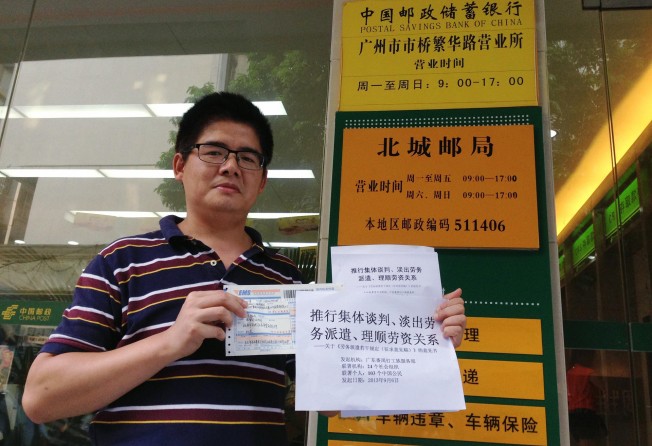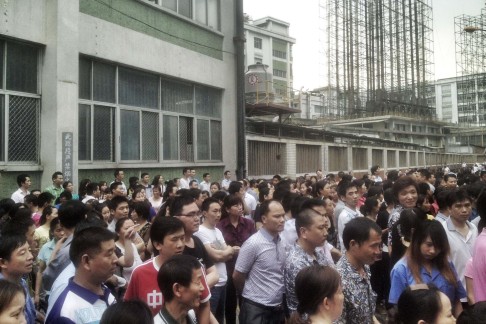
Fertile ground for labour activism
Yue Yuen strike shows growing role of workers' rights centres in Pearl River Delta factory disputes

When thousands of factory workers at plants that make Nike and Adidas shoes laid down their tools and walked out on April 14, Zeng Feiyang realised there was no time to waste.

“This is the largest industrial action in China,” said Zeng, who leads the mainland’s first non-government organisation specialising in labour matters.
“We wish to turn collective striking into collective bargaining and help workers organise their own unions to truly represent their interests,” he said.
More than 40,000 workers at a plant in Dongguan in Guangdong have picketed the factory for nearly two weeks.
Workers won a major victory last week after successfully forcing the Taiwanese shoe manufacturing giant, Yue Yuen Industrial Holdings, to agree to pay years of unmet contributions to the social insurance accounts of its many workers.
Zeng and his staff logged onto their computers and contacted Yue Yuen workers. The activist organised two video conferences, advised workers to seek collective bargaining rights and gave them legal advice.
He also reached out to the official Guangdong Federation of Trade Unions and prodded foreign media to report the event.
“There are many factories in the Yangtze River Delta too, but authorities’ control in that region is too strict for anything to blossom,” Zeng said.
Guangdong, the nation’s economic engine for the past two decades, has drawn the greatest number of migrant workers – 27 million in the province last year alone.
Labour disputes create a huge demand for rights work. With the city’s close proximity to Hong Kong, Zeng said the number of NGOs in southern China is growing rapidly.
More than 60 labour rights NGOs exist in China, Zeng said, most focusing on labour rights. They include 10 in Beijing and about five in the Yangtze River Delta. The remainder operate in the Pearl River Delta.
More than 90 per cent of the organisations get financial support from overseas foundations.
Mainland NGOs have always existed in a legal grey area. For years they could not register as social groups. They would instead either register as business units or as subsidiaries of official bodies, which tends to compromise their independence.
This began to change in 2012 when then Guangdong party secretary, now vice-premier, Wang Yang proposed relaxing NGO registration requirements to recognise their legal status, allowing them to seek funding.
The policy, though, was selectively applied. Many labour rights groups remain in a legal limbo.
Only the All-China Federation of Trade Unions and its local subsidiaries are legally allowed to represent workers, said Guan Tieliu, a Shenzhen-based lawyer specialising in labour issues.
Yet the government-affiliated body seldom serves the interests of workers against their employers. It merely provides entertainment or cultural programmes, according to labour rights activists.
This [the market] has created a natural hotbed for labour groups
“Labour groups are not supposed to provide legal advice or represent workers but that’s exactly what they are doing. This has made them easy targets for official crackdowns,” Guan said.
NGOs survive in grey areas of the law by claiming to provide secretarial services to workers who approach them for help, he said.
The press office of the All-China Federation of Trade Unions could not be reached for comment. Its subsidiary in Guangdong issued a response on its social media account after receiving an open letter from Zeng urging it to become involved in the Yue Yuen dispute. The trade union asked local unions to protect workers’ legal rights but prodded them to return to work.
Unlike other NGOs helping with elderly or family services, independent labour rights groups face retaliation, for example for organising public gatherings that authorities deem to be threats to social stability. These groups are often subjected to crackdowns and harassment.
Staff at labour NGOs are often summoned to “drink tea” with state security agents, who question them about their latest activities or warn them to lay low on certain sensitive matters. These groups continue their work even when the authorities shut down their offices because of obscure fire safety violations and pressure landlords to cut off their water or electricity supply.
In 2012, staff at many NGOs had to hunt for new offices after landlords were pressured by the authorities to evict them, said Zhang Zhiru, director of the Spring Breeze Labour Dispute Centre in Shenzhen. Telephones and computers are under constant surveillance and spying cameras are installed outside NGO offices.
In the same year, Guangdong authorities shut down several labour NGOs in Shenzhen, including seven offices rented by Zhang, even as the new registration policy took effect.
“We believe the difficulty is only temporary. There is still plenty of scope for growth,” Zeng said. “Employees who used to work in factories are now gradually shifting to the service industry and they still need us.”
Last year, Pun Ngai, a sociology professor at Hong Kong Polytechnic University, polled 685 workers employed at Foxconn Technology Group factories in Shenzhen and Wuhan. The survey found that just 17 per cent of workers said that unions had played a role in raising their salaries.
Separate research found that 82 per cent of 40 million mainland migrant workers in the construction industry had not signed any labour contracts, said Pun, who is deputy director of the Joint Peking University Polytechnic University Social Work Research Centre, which published reports on work conditions in Foxconn factories.
Pun has been working with mainland construction workers since 2008. In March, her centre won the support of Chang Ka-mun, a Hong Kong delegate to the Chinese People’s Political Consultative Conference, to table a proposal calling for construction companies to be forced to sign labour contracts with migrant workers.
In 1996, fresh from school with a degree in politics and law, Zeng returned to Guangdong and became a civil servant in the northern city of Nanxiong. He found there was little to do at work but drink tea and read the newspaper.
“I found this fire in my heart, but there was no way to unleash it,” said Zeng.
He lasted less than a year before switching to one of the top five law firms in Guangzhou, representing corporate clients. But his bosses often asked him to ensure that migrant workers received lower compensation for on-the-job injuries than they were entitled to.

He found his calling when he met a migrant worker from Sichuan, Liao Xiaofeng. Liao taught himself law to claim unpaid wages for other migrant workers. In 1998, Zeng quit his law firm job and joined the Guangdong workers’ centre set up by Liao. Zeng’s pay for offering legal advice was only 600 yuan a month.
“The value of a human being cannot be measured by money,” Zeng said.
After Liao quit the centre to join a law firm as a labour dispute consultant, Zeng inherited the job. Zeng said they charged no fees and operating expenses came from his previous savings as a lawyer. His girlfriend of three years didn’t like the arrangement and they broke up.
In 2002 the centre became financially viable when a Hong Kong-based Christian group donated 2,000 yuan a month. In 2013, the centre received a US$15,000 donation from American sports shoe company Reebok International to open an office in Shiqi township in Panyu.
Zeng began to recruit volunteers to visit workers at home and at work, as well as in hospitals. They provided legal information and counselling services.
Zhang, one of Zeng’s first recruits more than 10 years ago, went on to become one of the most prominent labour rights activists.
During the Yue Yuen strike, Zhang was detained by authorities for nearly three days, along with his colleague Lin Dong. Lin faces criminal charges after being accused of “spreading untrue information about the strike”. He has not been released, Zhang said.
Despite the effort to suppress labour groups, the market economy model in Guangdong has increased the demand for NGO services in the region, Zeng said.
“With the market-based economy in Guangdong, this has created a natural hotbed for labour groups to grow,” Zeng said. “We have come a long way in pushing for civil society development and holding the government and corporations more accountable.”
Additional reporting by Gary Cheung
